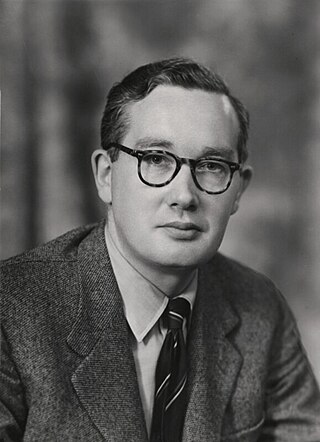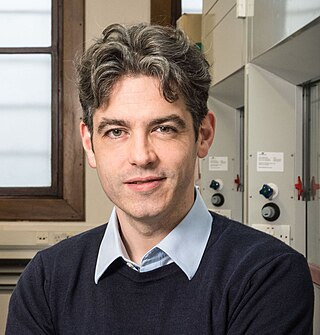Related Research Articles

The Royal Society of Chemistry (RSC) is a learned society and professional association in the United Kingdom with the goal of "advancing the chemical sciences". It was formed in 1980 from the amalgamation of the Chemical Society, the Royal Institute of Chemistry, the Faraday Society, and the Society for Analytical Chemistry with a new Royal Charter and the dual role of learned society and professional body. At its inception, the Society had a combined membership of 34,000 in the UK and a further 8,000 abroad.

Sir Derek Harold Richard Barton was an English organic chemist and Nobel Prize laureate for 1969.

Leroy "Lee" CroninFRSE FRSC is the Regius Chair of Chemistry in the School of Chemistry at the University of Glasgow. He was elected to the Fellowship of the Royal Society of Edinburgh, the Royal Society of Chemistry, and appointed to the Regius Chair of Chemistry in 2013. He was previously the Gardiner Chair, appointed April 2009.
Steven Victor Ley is Professor of Organic Chemistry in the Department of Chemistry at the University of Cambridge, and is a Fellow of Trinity College, Cambridge. He was President of the Royal Society of Chemistry (2000–2002) and was made a CBE in January 2002, in the process. In 2011, he was included by The Times in the list of the "100 most important people in British science".

Sir David William Cross MacMillan is a Scottish chemist and the James S. McDonnell Distinguished University Professor of Chemistry at Princeton University, where he was also the chair of the Department of Chemistry from 2010 to 2015. He shared the 2021 Nobel Prize in Chemistry with Benjamin List "for the development of asymmetric organocatalysis". MacMillan used his share of the $1.14 million prize to establish the May and Billy MacMillan Foundation.

Akira Suzuki is a Japanese chemist and Nobel Prize Laureate (2010), who first published the Suzuki reaction, the organic reaction of an aryl- or vinyl-boronic acid with an aryl- or vinyl-halide catalyzed by a palladium(0) complex, in 1979.
Charles Kemball CBE PRSE FRS FRSC FRIC was a Scottish chemist who served as president of the Royal Society of Edinburgh (1988–91) and as president of the Royal Institute of Chemistry (1974-6). He pioneered the use of mass spectrometry. and was a leading expert in heterogeneous catalysis.
Matthew Jonathan Rosseinsky is Professor of Inorganic Chemistry at the University of Liverpool. He was awarded the Hughes Medal in 2011 "for his influential discoveries in the synthetic chemistry of solid state electronic materials and novel microporous structures."

Harry Laurence Anderson is a British chemist in the Department of Chemistry, University of Oxford. He is well known for his contributions in the syntheses of supramolecular systems, exploration of the extraordinary physical properties of large pi-conjugated systems, and synthesis of cyclo[18]carbon. He is a Professor of Chemistry at Keble College, Oxford.

Polly Louise Arnold is director of the chemical sciences division at Lawrence Berkeley National Laboratory and professor of chemistry at the University of California, Berkeley. She previously held the Crum Brown chair in the School of Chemistry, University of Edinburgh from 2007 to 2019 and an Engineering and Physical Sciences Research Council (EPSRC) career fellowship.

John Paul Attfield is a Professor of Materials science in the School of Chemistry at the University of Edinburgh and Director of the Centre for Science at Extreme Conditions (CSEC).

Sharon Elizabeth Marie Ashbrook is a Professor of Physical Chemistry at the University of St Andrews. Her research is focused on the application of multinuclear solid-state NMR spectroscopy techniques as well as the combination of these techniques with first-principles calculations to investigate structure, order and dynamics of solid state materials.
Véronique Gouverneur is the Waynflete Professor of Chemistry at Magdalen College at the University of Oxford in the United Kingdom. Prior to the Waynflete professorship, she held a tutorial fellowship at Merton College, Oxford. Her research on fluorine chemistry has received many professional and scholarly awards.
David Parker is an English chemist, Chair Professor at Hong Kong Baptist University, and Emeritus Professor at the University of Durham.
Susan Elizabeth Gibson is a British research chemist, Professor and Chair in Chemistry and Director of the Graduate School at Imperial College London. Gibson is an expert in chemical synthesis and catalysis.

Eva Hevia is a Professor of Organometallic Chemistry at the University of Strathclyde, Glasgow and Professor at the Department of Chemistry and Biochemistry, the University of Bern.
Rachel O'Reilly is a British chemist and Professor at the University of Birmingham. She works at the interface of biology and materials, creating polymers that can mimic natural nanomaterials such as viruses and cells. She is a Fellow of the Royal Society of Chemistry and of the Royal Society.
Rebecca Jane Miriam Goss is a British organic chemist and professor at the University of St. Andrews recognized for her contributions to discovering and engineering biosynthesis of natural products, particularly anti-infectives, through the integration of synthetic biology and chemistry. Among other achievements and awards, Dr. Goss won the 2006 Royal Society of Chemistry Meldola Medal.
Alastair Ian Scott was a British-American organic chemist who achieved international renown for elucidating the biosynthetic pathway of vitamin B12.
Nicholas John Turner, is a British chemist and a Professor in the Department of Chemistry at The University of Manchester. His research in general is based on biochemistry and organic chemistry, specifically on biotechnology, cell biology, biocatalysis and organic synthesis.
References
- ↑ Lloyd Jones, Guy Charles (2009). "Author profile: Guy C. Lloyd-Jones". Angewandte Chemie International Edition. 48 (51): 9588. doi:10.1002/anie.200905581.
- 1 2 Lloyd-Jones, Guy Charles (1992). Catalytic hydrometallation (PhD thesis). University of Oxford.
- ↑ "Professor Guy Lloyd-Jones FRS". The Royal Society. Retrieved 5 May 2013.
- ↑ "Research". Lloyd-Jones research group website. Archived from the original on 20 October 2013. Retrieved 20 October 2013.
- ↑ Ball, L. T.; Lloyd-Jones, G. C.; Russell, C. A. (2012). "Gold-Catalyzed Direct Arylation" (PDF). Science. 337 (6102): 1644–1648. Bibcode:2012Sci...337.1644B. doi:10.1126/science.1225709. hdl: 20.500.11820/3c9b8e62-76a8-4e14-8f6d-fbaff8b61bd4 . PMID 23019647. S2CID 46286973.
- ↑ Hughes, D. L.; Lloyd-Jones, G. C.; Krska, S. W.; Gouriou, L.; Bonnet, V. D.; Jack, K.; Sun, Y.; Mathre, D. J.; Reamer, R. A. (2004). "ASYMMETRIC CATALYSIS SPECIAL FEATURE PART I: Mechanistic studies of the molybdenum-catalyzed asymmetric alkylation reaction". Proceedings of the National Academy of Sciences. 101 (15): 5379–5384. Bibcode:2004PNAS..101.5379H. doi: 10.1073/pnas.0306918101 . PMC 397389 . PMID 15056759.
- ↑ "Professor Guy Lloyd-Jones". University of Bristol, School of Chemistry website. Retrieved 1 June 2012.
- 1 2 "Professor Guy Lloyd–Jones". Lloyd-Jones research group website. Archived from the original on 20 October 2013. Retrieved 20 October 2013.
- ↑ "RSC Hickinbottom Award Previous Winners". Royal Society of Chemistry. Retrieved 1 June 2012.
- ↑ "Liebig-Lectureship". GDCh. Retrieved 1 June 2012.
- ↑ "RSC Corday–Morgan Prize Previous Winners". Royal Society of Chemistry. Retrieved 1 June 2012.
- ↑ "Royal Society elects new Fellows for 2013". The Royal Society. Retrieved 4 May 2013.
- ↑ "Professor Guy Charles Lloyd-Jones FRS, FRSC FRSE - The Royal Society of Edinburgh". The Royal Society of Edinburgh. Retrieved 12 February 2018.